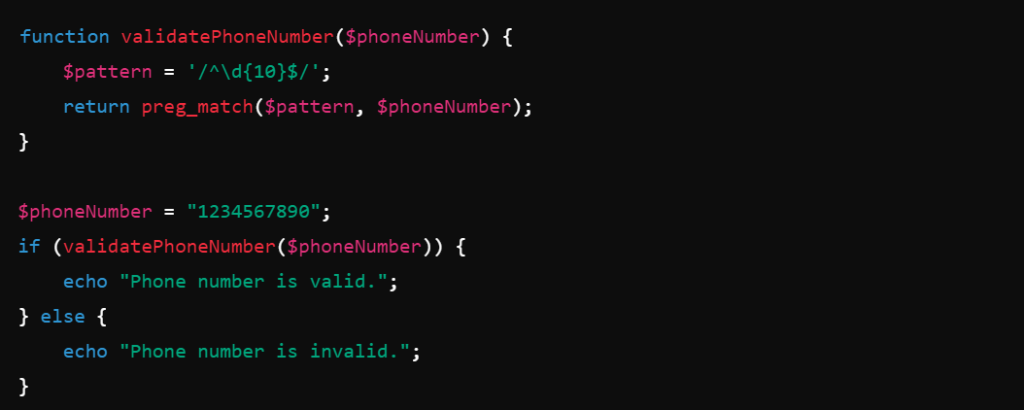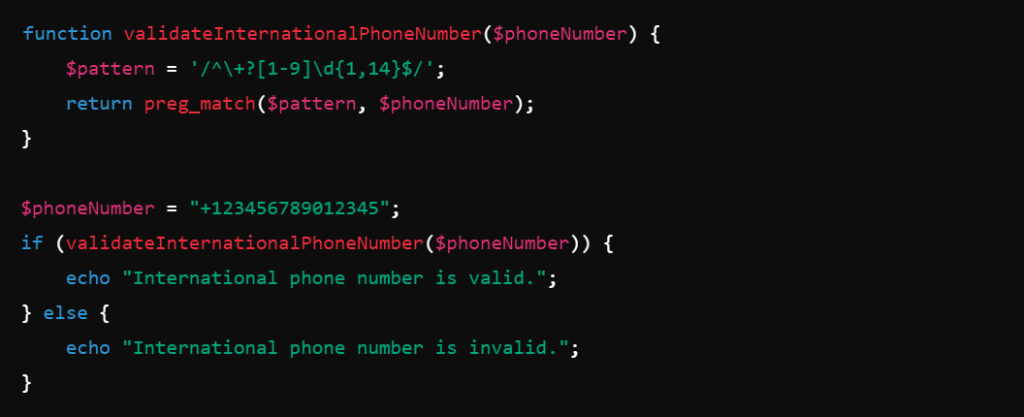Validating phone numbers is a common requirement in web applications to ensure the data entered by users is accurate and consistent. PHP, being a versatile server-side scripting language, offers multiple methods to validate phone numbers effectively. This article explores various techniques to validate phone numbers in PHP, including the use of regular expressions, built-in functions, and third-party libraries.
1. Basic Validation Using Regular Expressions
Regular expressions (regex) provide a powerful way to define patterns for validating data formats. For phone numbers, regex can be used to check if the input matches the expected pattern. Here’s a simple example to validate a basic 10-digit phone number:

In this example, ^\d{10}$ ensures the phone number consists of exactly 10 digits. However, phone numbers often vary in format, so the regex can be adjusted to accommodate different styles, such as including country codes, dashes, or spaces.
2. Handling International Phone Numbers
For international phone numbers, the regex pattern becomes more complex. Here’s an example to validate international phone numbers:

The pattern ^\+?[1-9]\d{1,14}$ allows an optional plus sign (+) at the beginning, followed by a digit between 1 and 9, and then up to 14 more digits. This pattern aligns with the E.164 international phone number formatting standard.
3. Using PHP’s Built-in Functions
While regex is powerful, PHP also offers built-in functions for validation, especially for more complex scenarios. The filter_var function, with the FILTER_VALIDATE_REGEXP filter, can be used for custom regex validation:
function validatePhoneNumberWithFilter($phoneNumber) {
$pattern = '/^\+?[1-9]\d{1,14}$/';
return filter_var($phoneNumber, FILTER_VALIDATE_REGEXP, array("options" => array("regexp" => $pattern)));
}
$phoneNumber = "+123456789012345";
if (validatePhoneNumberWithFilter($phoneNumber)) {
echo "Phone number is valid.";
} else {
echo "Phone number is invalid.";
}
This approach integrates regex validation with PHP’s filter_var function, offering a more readable and maintainable code structure.
4. Leveraging Third-Party Libraries
For robust phone number validation, especially in applications requiring extensive international support, third-party libraries like libphonenumber (a PHP port of Google’s libphonenumber library) are highly recommended. This library provides comprehensive phone number validation, formatting, and parsing capabilities.
First, install the library using Composer:

Then, use the library in your PHP script:

The libphonenumber library allows for parsing, formatting, and validating phone numbers across various regions, making it ideal for international applications.
Validating phone numbers in PHP can be approached in several ways, from simple regex patterns to using advanced libraries like libphonenumber. The choice of method depends on the specific requirements of your application, such as the need to support various formats and international numbers. By leveraging these techniques, you can ensure the phone numbers entered by users are valid and correctly formatted.

